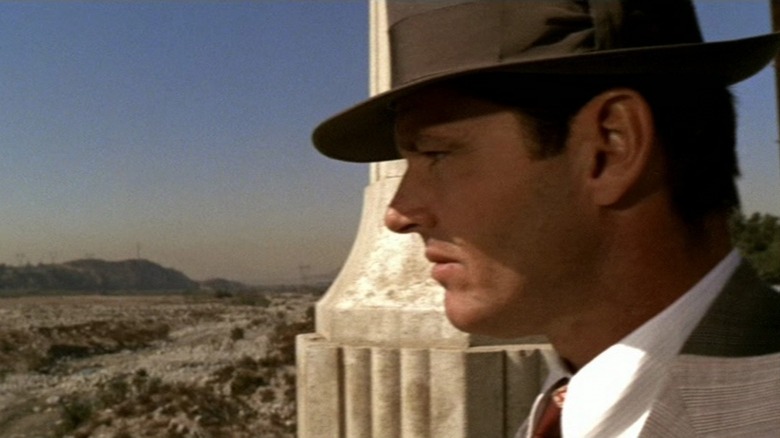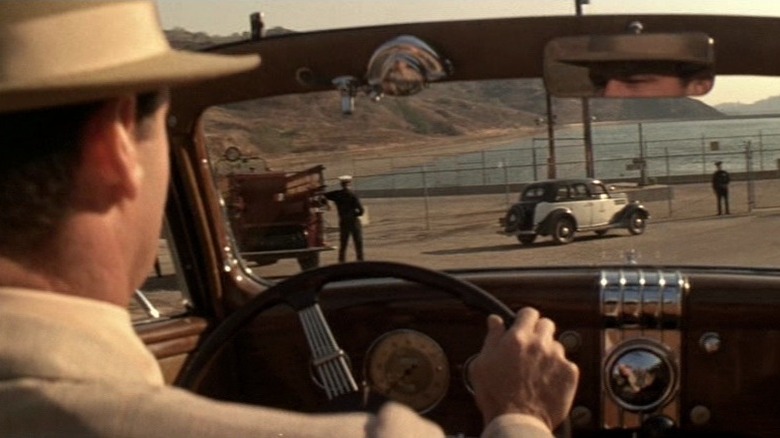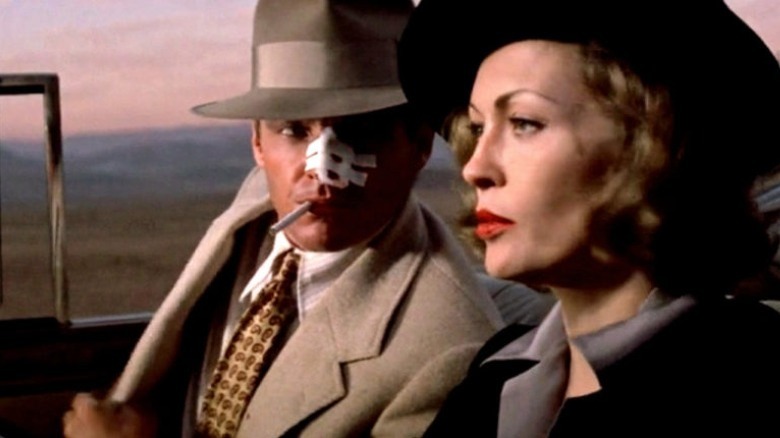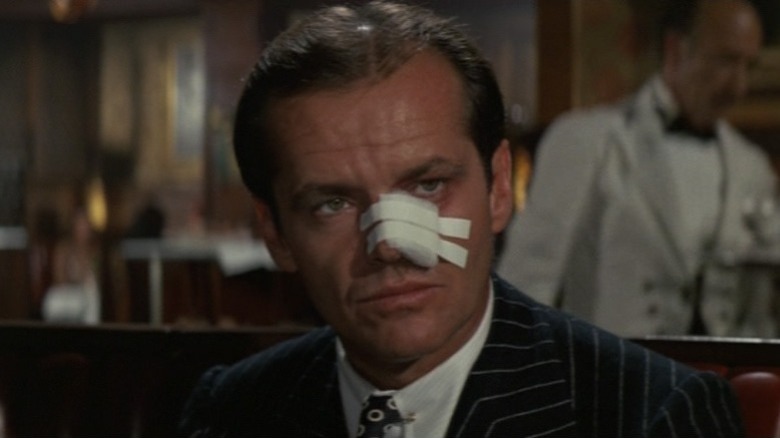The Reason Paramount Thought Chinatown Was Going To Be A Disaster
When you think of iconic '70s soundtracks, "Chinatown" probably isn't the first film to come to mind. The "Jaws" opening theme might pop into your head, or perhaps even the slow, sultry music in "Taxi Driver." The theme in "Chinatown" isn't nearly as flashy (or as catchy) — instead, it almost seems hypnotizing. A lazy, dreamlike trumpet sounds through the air, dancing between the same few notes as if it were too lethargic to travel much farther. The other instruments seem just as wary. It's almost as though they've been drained of energy — perhaps desperate for water, so harshly affected by the film's drought that they are no longer capable of feeling devastated.
It's the perfect soundtrack for a mystery film where the detective is always one step behind the conspiracy, where he uncovers the truth but not soon enough to prevent a wake of dead bodies (or a horrific cycle of abuse). A movie where he's encouraged to "forget it" because these kinds of tragedies happen all the time, desensitizing the very people who should be preventing them. But the soundtrack in "Chinatown" was actually a last-minute addition — and a desperate attempt to save the film.
Who's going to sit in a drive-in and listen to this all the time?
While "Chinatown" is considered a classic today (and is even getting a making-of movie, nearly 50 years later), Paramount wasn't too confident in the film at first. In an interview with Paul Iorio, "Chinatown" producer Robert Evans recalled the struggles between the film's crew and Paramount's team:
"Most of the people at Paramount, including distribution, which didn't know how to distribute it [were dismissive of the movie]. ... In those days, during the summer, 20 percent of your business came from drive-in [theaters]. [Execs said], 'Who's going to sit in a drive-in and listen to this all the time?'"
To be fair, Paramount's team had a point. "Chinatown" features a strong story, but marketing it would be quite the challenge (especially with all the unsavory elements at the end — do you warn people? How could you without giving away the film's twists?). In response to Paramount execs and a particularly unfavorable test screening, the crew went to work on upgrading the film. A new "haunting" score was devised, which, according to Evans, "changed the entire picture to a great extent." The film's color grading was also improved.
Marketing the haze
The new score ultimately gave the film a dreamlike feeling, almost like running in the sand. Having a protagonist who struggles (and frequently fails) to change their circumstances is a New Hollywood staple, but "Chinatown" took things to the next level. Unlike Benjamin Braddock in "The Graduate," Jake Gittees wasn't just "drifting" — he was actively running around, desperately trying to escape a hazy state and unravel a mystery. The dreamy music is a reflection of his struggle. And while Jake was lucky enough to succeed, his only reward was carnage.
The film's marketing material plays heavily into the murky confusion that Jake and the rest of the characters can't seem to shake off. In the movie poster, a sketch of Jake looks towards Faye Dunaway's disembodied facial features, his cigarette smoke curling around the edges of the poster, too dark to see past. The graphic does a good job of invoking both the lulling spell of the soundtrack and the deeply distorted world of original film noir classics. It's the perfect promise of things to come, even if the content in "Chinatown" is too disturbing to fully advertise.
The new score had an ironic twist
Although the film's new score undoubtedly plays a large role in the viewing experience (let's be real, the movie's overall mood is a big part of why the ending is so shocking — it's like getting jolted out of a dream, only to be met with a nightmare), the new soundtrack also brings an amusing twist. While Evans noted that the new music was "one of the stars of the film," the change was only made after unfavorable test screenings and negative feedback from marketing teams. In other words, monetary success, corporate interests, and audience digestibility were kept in mind, at least on some level, when the new score was produced.
Of course, that's not to say that the soundtrack doesn't work, or that it was a mistake to change it. But its history does feel a bit ironic considering the fact that Jake spends the entire movie trying to uncover a conspiracy that is essentially driven by greed. That being said, Jake is stumbling through a world where people don't care, whereas the changes were largely a labor of love: Evans recalled that the team was working as early as 4:30 am to get the last-minute editing finished in time. Regardless, the irony is a little amusing — simultaneously a nice break from the bleakness generally associated with "Chinatown" and an inheritor of the film's irreverence.



